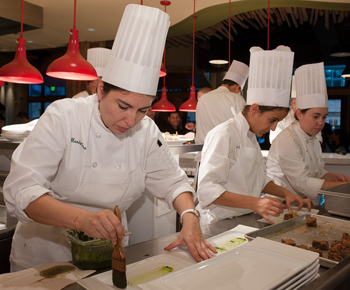CIA Bachelor’s-Degree Concentrations Forge Future of Culinary Profession with Beverage Management, Farm-to-Table Cooking and Latin Cuisines
 As students go to college this fall, The Culinary Institute of America (CIA) is offering them exciting new education options. These new concentrations—in beverage management, farm-to-table cooking and Latin cuisines—give students the chance to focus their studies on a particular area of interest in the food world.
As students go to college this fall, The Culinary Institute of America (CIA) is offering them exciting new education options. These new concentrations—in beverage management, farm-to-table cooking and Latin cuisines—give students the chance to focus their studies on a particular area of interest in the food world.
Students enrolled in the bachelor’s-degree-management programs at the CIA’s Hyde Park, N.Y., campus can choose a concentration that includes 15-credit semesters at the college’s campuses in St. Helena, Calif., or San Antonio, Texas. Visitors to those campuses can reap the rewards of the students’ lessons with new and exciting dining experiences.
“The rapid pace of foodservice innovation is creating new demands for specialized skills and knowledge, and opportunities for students to get this knowledge within their broader education are critical for career success,” says CIA President Dr. Tim Ryan, CMC. “Professions develop specialties as they advance—which is very evident in medicine and law. This is also true for the culinary profession, where specialized cuisine and management knowledge are key for restaurants seeking new ways to sharpen their competitive edge and profitability.”
The concentrations expand upon the college’s bachelor’s-degree programs that pioneered culinary-management education in the 1990s.
Students in the Advanced Wine, Beverage, and Hospitality concentration spend a semester at the CIA’s Greystone campus in the heart of California's Napa Valley wine country. Throughout the program, they get an upper-level wine-and-beverage education and study the advanced principles of management as they relate to hospitality and restaurant service.
American Food Studies: Farm-to-Table Cooking also features a semester away at Greystone, in the epicenter of the farm-to-table movement in Northern California. The culinary director of the program is legendary chef Larry Forgione, a 1974 CIA graduate, hailed as “the godfather of American cuisine.” He is credited with changing the way Americans eat today by embracing the virtues of using seasonal, local ingredients. Students learn the intricacies of local sourcing, ingredient selection and menu development, and they work on a farm adjacent to the campus, which supplies some of the meat and produce for the food they prepare.
Latin Cuisines immerses students in the unique ingredients, culinary techniques and traditions of the diverse cultures of South America, Central America, Mexico and the Caribbean. The college is offering this cuisine specialization in recognition of the rapid growth and scale of Latin meals, accounting for an estimated 33% of ethnic restaurant sales. Students who choose this concentration enjoy a semester at the CIA’s campus in San Antonio—the gateway to Latin America.
Much like music conservatory programs, masters (in this case, chefs and vintners) serve as guest instructors alongside the college’s own world-class faculty. At the end of their time together, students present what they’ve learned from some of the biggest names in their field.
At Greystone, this opportunity for the public to enjoy the results of the scholars’ studies is in the form of The Conservatory, a student-led “crop-up” restaurant. Students from American Food Studies prepare the meal and those in Advanced Wine, Beverage and Hospitality create the beverage menu and provide service. In San Antonio, students present their “projects” at Nao Restaurant.
These three concentrations for bachelor’s-degree students join the college’s new bachelor’s-degree major in culinary science, which launched at the CIA’s Hyde Park campus earlier in 2013. Curriculum is now being developed for additional concentrations that will be offered in the near future.
Photo:Among the concentrations that students from The Culinary Institute of America can choose is to learn Latin cuisines at the college’s San Antonio campus. As part of their conservatory-style education, students prepare special dinners at the CIA’s Nao Restaurant. Courtesy of Darren Abate/CIA.
